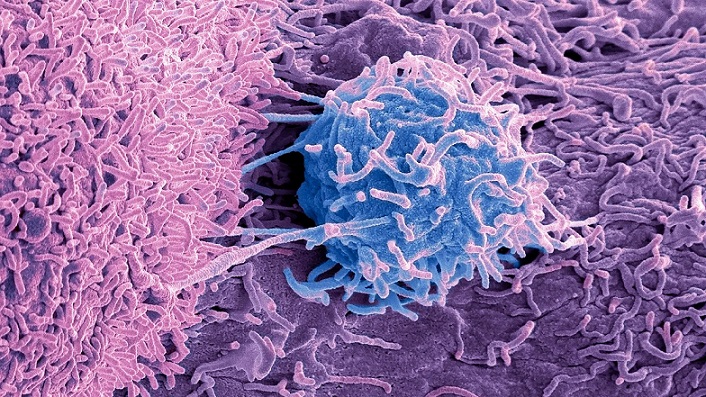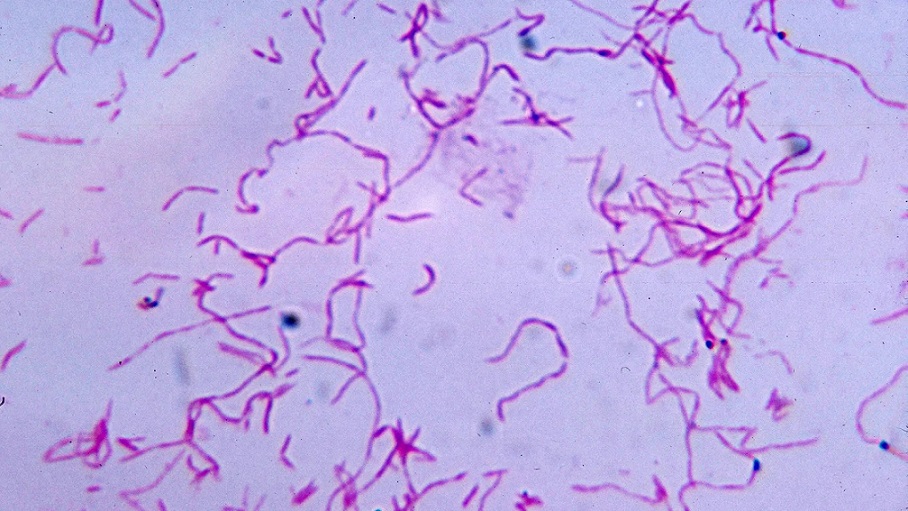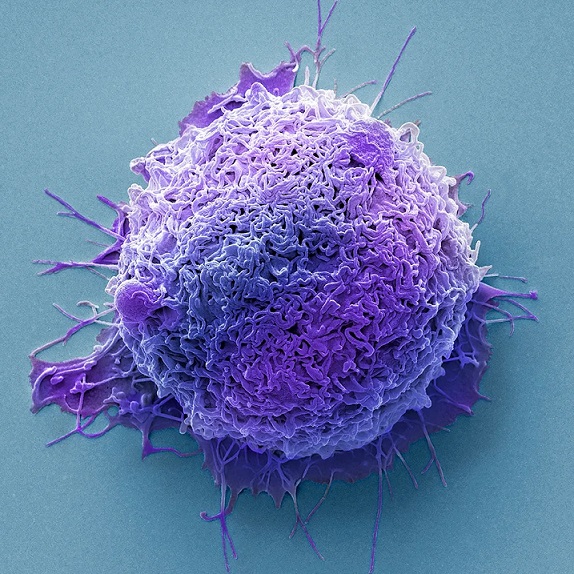肿瘤内微生物的奥秘:它们究竟在帮助还是抑制肿瘤的生长?-ag九游会j9登录入口旧版
the mystery of microbes that live inside tumours译文简介
细菌和真菌潜伏在肿瘤内部和周围,这些微生物居民对于我们了解癌症的形成机制和治疗癌症可能至关重要。
正文翻译

bacteria and fungi can be found lurking in and around tumours. these microbial residents may be crucial to understanding how cancer develops and how to treat it.
细菌和真菌潜伏在肿瘤内部和周围,这些微生物居民对于我们了解癌症的形成机制和治疗癌症可能至关重要。
our bodies are thriving habitats for other life-forms. our guts, mouths, noses and skin support diverse communities of microbes that can be both good and bad for our health. but in recent years scientists have been finding microbes in an altogether more surprising place – in tumours.
我们人体是其他生物繁衍的栖息地。我们的内脏、嘴巴、鼻子、皮肤养活着各种微生物群落,它们对我们的健康既有利又有弊。但近年来,科学家们在一个完全出乎意料的部位——肿瘤中发现了微生物。
我们人体是其他生物繁衍的栖息地。我们的内脏、嘴巴、鼻子、皮肤养活着各种微生物群落,它们对我们的健康既有利又有弊。但近年来,科学家们在一个完全出乎意料的部位——肿瘤中发现了微生物。
it is common to think of cancers as simply masses of a patient's own cells that malfunction and grow uncontrollably. they are in fact communities of many different cell types, which is part of the reason why cancers are so hard to treat – it is difficult to target them without harming healthy tissue too.
人们通常认为,癌症只是患者自身的大量细胞出现故障和生长失控。其实癌症是由许多不同类型的细胞组成的群落,这也是癌症难以治疗的部分原因——很难在不损伤健康组织的情况下靶向消灭癌细胞。
人们通常认为,癌症只是患者自身的大量细胞出现故障和生长失控。其实癌症是由许多不同类型的细胞组成的群落,这也是癌症难以治疗的部分原因——很难在不损伤健康组织的情况下靶向消灭癌细胞。
but tumours also play host to a collection of cells from other life-forms entirely – bacteria and fungi. some thrive in the environment around a tumour while others live inside the cancer cells themselves.
但肿瘤也完全是其他生物细胞的宿主——细菌和真菌。一些在肿瘤周围的环境中茁壮成长,另一些则存在于癌细胞的内部。
但肿瘤也完全是其他生物细胞的宿主——细菌和真菌。一些在肿瘤周围的环境中茁壮成长,另一些则存在于癌细胞的内部。
until recently, however, the role that these microbes play in tumours has not been clearly understood. now scientists are starting to unravel whether these tumour-associated microorganisms are accomplices that assist cancer cells as they develop or just unfortunate bystanders caught up in the tumour. and the answers could provide new approaches to treating and preventing cancers.
但直到最近,科学家一直没有搞清楚这些微生物在肿瘤中发挥的作用。现在科学家着手揭开这个谜团,与肿瘤相关的微生物是癌细胞生长的帮凶?还是只是不幸卷入肿瘤中的旁观者?答案也许能提供治疗和预防癌症的新方法。
但直到最近,科学家一直没有搞清楚这些微生物在肿瘤中发挥的作用。现在科学家着手揭开这个谜团,与肿瘤相关的微生物是癌细胞生长的帮凶?还是只是不幸卷入肿瘤中的旁观者?答案也许能提供治疗和预防癌症的新方法。

fusobacterium nucleatum is commonly associated with the mouth, but is also found in many tumours
具核梭杆菌通常与口腔相关,但也存在于许多肿瘤中。
in a 2017 study ravid straussman, a cancer biologist at the weizmann institute of science in rehovot, israel and his team showed that some bacteria living inside human pancreatic cancers can protect the tumours by inactivating a common chemotherapy drug. they found that one particular class of bacteria, known as gammaproteobacteria, could break down gemcitabine: a drug used to treat a number of cancers including those found in the bladder, breast and pancreas. this helped the tumours become resistant to the drug. when the team injected mice with colon cancer with the bacteria, the mice's cancers also became resistant to the drug. but when the researchers gave the mice an antibiotic alongside the chemotherapy drug, the resistance disappeared.
拉韦德·施特劳斯曼是以色列雷霍沃特的魏茨曼科学研究所的癌症生物学家,他和团队在 2017 年的一项研究发现,人类胰腺癌内部的某些细菌能使一种常见的化疗药物失去活性,以此来保护肿瘤。他们发现一种特殊的γ‐变形菌纲可以分解吉西他滨:这是一种用于治疗多种癌症的药物,包括膀胱癌、乳腺癌、胰腺癌。这有助于肿瘤对药物产生耐药性。当研究团队给患有结肠癌的小鼠注射这种细菌时,小鼠的癌症也对该药物产生了耐药性。但当研究人员给小鼠联合注射抗生素和化疗药物时,耐药性消失了。
拉韦德·施特劳斯曼是以色列雷霍沃特的魏茨曼科学研究所的癌症生物学家,他和团队在 2017 年的一项研究发现,人类胰腺癌内部的某些细菌能使一种常见的化疗药物失去活性,以此来保护肿瘤。他们发现一种特殊的γ‐变形菌纲可以分解吉西他滨:这是一种用于治疗多种癌症的药物,包括膀胱癌、乳腺癌、胰腺癌。这有助于肿瘤对药物产生耐药性。当研究团队给患有结肠癌的小鼠注射这种细菌时,小鼠的癌症也对该药物产生了耐药性。但当研究人员给小鼠联合注射抗生素和化疗药物时,耐药性消失了。
further to these findings, research published in 2019 by a team at tohoku university in japan looked retrospectively at patients suffering from advanced cancers who were treated with either a chemotherapeutic drug alone and those who also received an antibiotic in addition to the chemotherapy in an attempt to prevent or treat an existing infection. they found that patients who were given an antibiotic had a better response to treatment. although the study did not examine the amount of bacteria present in the cancer tissue of these patients, the researchers speculated that the antibiotics might have eliminated tumour-associated bacteria, which may have been interfering with the cancer treatment.
除了这些发现之外,日本东北大学的一个团队于 2019 年发表的研究报告回顾了两类癌症晚期患者,一类仅接受化疗药物治疗,另一类为了预防或治疗现有感染,除了化疗还接受了抗生素治疗。他们发现接受抗生素治疗的患者有更好的疗效。尽管该研究没有检查患者的癌症组织内存在的细菌数量,但研究人员推测,抗生素可能消灭了与肿瘤相关的细菌,而这些细菌可能一直在干扰癌症治疗。
原创翻译:龙腾网 http://www.ltaaa.cn 转载请注明出处
除了这些发现之外,日本东北大学的一个团队于 2019 年发表的研究报告回顾了两类癌症晚期患者,一类仅接受化疗药物治疗,另一类为了预防或治疗现有感染,除了化疗还接受了抗生素治疗。他们发现接受抗生素治疗的患者有更好的疗效。尽管该研究没有检查患者的癌症组织内存在的细菌数量,但研究人员推测,抗生素可能消灭了与肿瘤相关的细菌,而这些细菌可能一直在干扰癌症治疗。
原创翻译:龙腾网 http://www.ltaaa.cn 转载请注明出处
the studies offer a tantalising hint of what might be going on within tumours.
这些研究为肿瘤内可能发生的情况提供了诱人的线索。
这些研究为肿瘤内可能发生的情况提供了诱人的线索。
straussman and his team are now hoping to build on these studies with a clinical trial involving patients with pancreatic cancer who failed their first line treatment. they will give patients an antibiotic known to act against gammaproteobacteria, alongside a course of the chemotherapy drug gemcitabine, to see if the antibiotic improves their outcomes.
施特劳斯曼和他的团队现在希望在这些研究的基础上,对一线治疗失败的胰腺癌患者进行临床试验。他们将给患者服用一种已知能够对抗γ‐变形菌的抗生素,同时服用一个疗程的化疗药物吉西他滨,以观察抗生素是否有助于改善他们的疗效。
施特劳斯曼和他的团队现在希望在这些研究的基础上,对一线治疗失败的胰腺癌患者进行临床试验。他们将给患者服用一种已知能够对抗γ‐变形菌的抗生素,同时服用一个疗程的化疗药物吉西他滨,以观察抗生素是否有助于改善他们的疗效。
but bacteria might also play other roles in cancer beyond protecting tumours from drug treatment.
但细菌不仅保护肿瘤免受药物治疗,还可能在癌症中发挥着其他作用。
但细菌不仅保护肿瘤免受药物治疗,还可能在癌症中发挥着其他作用。
in 2020, straussman's team looked at more than 1,500 human tumours across seven different cancer types: breast, lung, ovary, pancreas, melanoma, bone and brain. they found all of the tumour types were invaded by bacteria, which lived inside the cancer cells and some of the immune cells. different tumour types had distinct communities of bacteria.
2020 年,施特劳斯曼的团队研究了1500 多个人类肿瘤,涵盖7类癌症:乳腺癌、肺癌、卵巢癌、胰腺癌、黑色素瘤、骨癌、脑癌。他们发现所有类型的肿瘤都被细菌入侵了,它们存在于癌细胞和某些免疫细胞内。不同类型的肿瘤具有不同的细菌群落。
2020 年,施特劳斯曼的团队研究了1500 多个人类肿瘤,涵盖7类癌症:乳腺癌、肺癌、卵巢癌、胰腺癌、黑色素瘤、骨癌、脑癌。他们发现所有类型的肿瘤都被细菌入侵了,它们存在于癌细胞和某些免疫细胞内。不同类型的肿瘤具有不同的细菌群落。
"each of these bacteria have adapted to the unique tumour microenvironment in which they live," says straussman. "in lung cancer, we demonstrated how people who smoke have more bacteria which can degrade nicotine – which is a smoke-related metabolite. in bone cancers, we see bacteria which metabolise hydroxyproline, which is a metabolite enriched in bone tumours."
“其中的每一种细菌都适应了它们所在的独特的肿瘤微环境”,施特劳斯曼说道。“在肺癌中,我们发现吸烟者拥有较多可以降解尼古丁的细菌,尼古丁是一种与吸烟相关的代谢物。在骨癌中,我们发现了代谢羟脯氨酸的细菌,羟脯氨酸是骨肿瘤中富含的代谢物”。
“其中的每一种细菌都适应了它们所在的独特的肿瘤微环境”,施特劳斯曼说道。“在肺癌中,我们发现吸烟者拥有较多可以降解尼古丁的细菌,尼古丁是一种与吸烟相关的代谢物。在骨癌中,我们发现了代谢羟脯氨酸的细菌,羟脯氨酸是骨肿瘤中富含的代谢物”。
in many cases it is still unclear whether the bacteria are helping the sufferer by keeping the cancer cells under control.
在许多情况下,科学家仍不清楚细菌是否通过抑制癌细胞来帮助患者。
在许多情况下,科学家仍不清楚细菌是否通过抑制癌细胞来帮助患者。
bacteria found in some types of breast cancer, for example, can detoxify arsenate, a type of carcinogen known to increase the risk of breast cancer. others can produce a chemical called mycothiol, which helps to reduce levels of harmful reactive oxygen molecules that can damage dna.
例如,在某些类型的乳腺癌中发现的细菌可以清除砷酸盐,它是一种已知会增加乳腺癌风险的致癌物质。还有些细菌可以产生一种叫做真菌硫醇的化学物质,它有助于降低有害的活性氧分子的水平,而活性氧分子会破坏dna。
例如,在某些类型的乳腺癌中发现的细菌可以清除砷酸盐,它是一种已知会增加乳腺癌风险的致癌物质。还有些细菌可以产生一种叫做真菌硫醇的化学物质,它有助于降低有害的活性氧分子的水平,而活性氧分子会破坏dna。
there is growing evidence, however, that in some cases, the tumour-dwelling bacteria may actually be making cancers worse.
然而越来越多的证据表明,在某些情况下,肿瘤内的细菌可能会使癌症恶化。
然而越来越多的证据表明,在某些情况下,肿瘤内的细菌可能会使癌症恶化。
"more and more papers are coming out showing how they may be part of the carcinogenesis," says straussman. the bacteria may also be altering the ability of the immune system to target and destroy cancer cells, he adds. "but we are really scratching the surface here." much more needs to be done, he says, to study the effects that bacteria inside tumours have on the course of cancers.
斯特劳斯曼说:“越来越多的论文表明,它们可能是致癌因素之一”。他补充道,它们还可能改变免疫系统靶向消灭癌细胞的能力。“但我们确实只是浅尝辄止”。他表示为了研究肿瘤内的细菌对癌症病程的影响,还有很多工作要做。
斯特劳斯曼说:“越来越多的论文表明,它们可能是致癌因素之一”。他补充道,它们还可能改变免疫系统靶向消灭癌细胞的能力。“但我们确实只是浅尝辄止”。他表示为了研究肿瘤内的细菌对癌症病程的影响,还有很多工作要做。
there are already some clues. for example, a 2022 study by scientists in china suggests some bacteria in breast tumours might make it easier for cancer cells to spread to other parts of the body. the researchers found bacteria living inside breast tumour cells that were circulating in the blood of mice. these circulating cancer cells are shed from the primary tumour and can travel to other parts of the body, where they can metastasise and grow. however, as the tumour cells rattle around in the bloodstream, they are exposed to stress that causes some of them to break apart.
目前已经有些线索了。例如,中国科学家2022 年的一项研究表明,乳腺肿瘤中的某些细菌可能会使癌细胞更容易扩散到身体的其他部位。研究人员在小鼠血液中循环的乳腺肿瘤细胞内发现了细菌。这些循环癌细胞是从原发肿瘤中脱落的,可以转移到身体的其他部位进行扩散和生长。然而,肿瘤细胞在血液中循环时会受到压力,导致部分肿瘤细胞破裂。
目前已经有些线索了。例如,中国科学家2022 年的一项研究表明,乳腺肿瘤中的某些细菌可能会使癌细胞更容易扩散到身体的其他部位。研究人员在小鼠血液中循环的乳腺肿瘤细胞内发现了细菌。这些循环癌细胞是从原发肿瘤中脱落的,可以转移到身体的其他部位进行扩散和生长。然而,肿瘤细胞在血液中循环时会受到压力,导致部分肿瘤细胞破裂。
the chinese researchers found that the microbes inside these mobile tumour cells seem to protect them from some of the stress they experience. they appear to do this by helping to reorganise internal cellular support structures known as the cytoskeleton so the cells are more robust. when the scientists eliminated these bacteria from the mice tumours, the tumours appeared to lose their ability to metastasise, although the primary breast cancer continued growing.
中国研究人员发现,这些转移的肿瘤细胞内的微生物似乎保护它们免受部分压力。微生物似乎通过重组被称为细胞骨架的细胞内部支撑结构来实现这一点,从而使肿瘤细胞更加坚固。当科学家消灭小鼠肿瘤内的细菌时,肿瘤似乎失去了转移能力,但原发的乳腺癌仍在继续生长。
中国研究人员发现,这些转移的肿瘤细胞内的微生物似乎保护它们免受部分压力。微生物似乎通过重组被称为细胞骨架的细胞内部支撑结构来实现这一点,从而使肿瘤细胞更加坚固。当科学家消灭小鼠肿瘤内的细菌时,肿瘤似乎失去了转移能力,但原发的乳腺癌仍在继续生长。
"there is growing evidence that specific microbes in the gut, the skin, and other mucosal organs, as well as in tumours, can either promote tumour growth and progression, or alternatively antagonise it," says douglas hanahan, an oncologist at the swiss institute for experimental cancer research in lausanne, switzerland, and the author of hallmarks of cancer: new dimensions. however, the picture remains murky. "the landscape is very complicated, and while there are clues, there is no definitive clarity about who does what."
位于瑞士洛桑的瑞士实验性癌症研究所的肿瘤学家、《癌症的特征:新维度》一书的作者道格拉斯·哈纳汉表示:“越来越多的证据表明,肠道、皮肤、其他粘膜器官、肿瘤内部的特定微生物可以促进或抑制肿瘤的生长和发展”。然而,情况仍然不明朗。“情况非常复杂,虽然有线索,但尚不明确哪种细菌起什么作用”。
位于瑞士洛桑的瑞士实验性癌症研究所的肿瘤学家、《癌症的特征:新维度》一书的作者道格拉斯·哈纳汉表示:“越来越多的证据表明,肠道、皮肤、其他粘膜器官、肿瘤内部的特定微生物可以促进或抑制肿瘤的生长和发展”。然而,情况仍然不明朗。“情况非常复杂,虽然有线索,但尚不明确哪种细菌起什么作用”。
other studies looked at fusobacterium nucleatum, an oral bacterium associated with gum disease, but might also be associated with a number of different cancers. it seems these bacteria can migrate from the mouth to colorectal cancer cell through the bloodstream. each bacterium carries specific particles on its surface that bind to the surface of cancer cells, allowing it to colonise them.
其他研究着眼于具核梭杆菌,这是一种与牙龈疾病相关的口腔细菌,但可能也与许多癌症有关。这些细菌似乎可以通过血液从口腔转移到结直肠癌细胞中,每种细菌的表面都带有特定的颗粒,这些颗粒与癌细胞的表面结合,使这种细菌寄生在癌细胞上。
其他研究着眼于具核梭杆菌,这是一种与牙龈疾病相关的口腔细菌,但可能也与许多癌症有关。这些细菌似乎可以通过血液从口腔转移到结直肠癌细胞中,每种细菌的表面都带有特定的颗粒,这些颗粒与癌细胞的表面结合,使这种细菌寄生在癌细胞上。
once in place, the bacteria can accelerate the growth and spread of tumours, by hampering the immune system's ability to kill cancer cells. a protein produced by fusobacterium nucleatum binds to a molecular control mechanism on the surfaces of human natural killer cells and t cells, which are both key parts of the immune system's defences against tumours. this binding inhibits the cells' ability to destroy cancer cells. the bacteria also deploy a molecular arsenal that makes cancer cells more resistant to chemotherapy.
一旦寄生到癌细胞上,具核梭杆菌就可以抑制免疫系统消灭癌细胞的能力,从而加速肿瘤的生长和扩散。具核梭杆菌产生一种蛋白质,它与人类的自然杀伤细胞和t淋巴细胞表面的分子调控机制相结合,这两者都是免疫系统防御肿瘤的关键部分。这种结合抑制了细胞消灭癌细胞的能力。这些细菌还部署了一种分子武器,使癌细胞对化疗具有更强的抵抗力。
一旦寄生到癌细胞上,具核梭杆菌就可以抑制免疫系统消灭癌细胞的能力,从而加速肿瘤的生长和扩散。具核梭杆菌产生一种蛋白质,它与人类的自然杀伤细胞和t淋巴细胞表面的分子调控机制相结合,这两者都是免疫系统防御肿瘤的关键部分。这种结合抑制了细胞消灭癌细胞的能力。这些细菌还部署了一种分子武器,使癌细胞对化疗具有更强的抵抗力。
furthermore, fusobacterium nucleatum's dna has been found in human breast cancer samples. this suggests it also affects tumours elsewhere in the body. in one study, when the bacteria were introduced to mice with breast cancer, it accelerated the progression and spread of the disease. giving the mice antibiotics prevented this.
另外,在人类乳腺癌样本中也发现了具核梭杆菌的 dna。这表明它也会影响身体其他部位的肿瘤。在一项研究中,当将细菌植入患有乳腺癌的小鼠体内时,它加速了乳腺癌的发展和扩散,但给小鼠服用抗生素防止了这种情况的发生。
另外,在人类乳腺癌样本中也发现了具核梭杆菌的 dna。这表明它也会影响身体其他部位的肿瘤。在一项研究中,当将细菌植入患有乳腺癌的小鼠体内时,它加速了乳腺癌的发展和扩散,但给小鼠服用抗生素防止了这种情况的发生。
it may seem tempting to include antibiotics in cancer therapies, but it is not as simple as that. many of the microbes in our bodies are benign or even beneficial, so a brute-force antibiotic treatment could cause more harm than good, says hanahan.
在癌症治疗中加入抗生素似乎很诱人,但事情没那么简单。哈纳汉说,我们体内的许多微生物都是良性甚至有益的,所以暴力使用抗生素治疗可能弊大于利。
在癌症治疗中加入抗生素似乎很诱人,但事情没那么简单。哈纳汉说,我们体内的许多微生物都是良性甚至有益的,所以暴力使用抗生素治疗可能弊大于利。
instead, researchers must try to unravel the full complexity of the tumour-associated microbiome. entire communities of microbes can be found within tumours, and they support each other in unexpected ways.
相反,研究人员必须设法揭开肿瘤相关微生物组的全部复杂性。肿瘤内可以找到整个微生物群落,它们以意想不到的方式相互支持。
相反,研究人员必须设法揭开肿瘤相关微生物组的全部复杂性。肿瘤内可以找到整个微生物群落,它们以意想不到的方式相互支持。

many of the bacteria associated with colorectal cancers can work together to make the patient's condition worse
许多与结直肠癌相关的细菌可以共同作用,使患者的病情恶化。
one such example revolves around the primary chemotherapeutic drug used to treat patients with colorectal cancer, 5-fluorouracil (5-fu). it seems to inhibit the growth of the troublesome fusobacterium nucleatum. however, certain strains of escherichia coli – commonbacteria found in the gut – render the drug inactive.
其中一个例子涉及用于治疗结直肠癌患者的主要化疗药物5-氟尿嘧啶。它似乎可以抑制麻烦的具核梭杆菌的生长。然而,某些大肠杆菌菌株(肠道中常见的细菌)会使药物失去活性。
原创翻译:龙腾网 http://www.ltaaa.cn 转载请注明出处
其中一个例子涉及用于治疗结直肠癌患者的主要化疗药物5-氟尿嘧啶。它似乎可以抑制麻烦的具核梭杆菌的生长。然而,某些大肠杆菌菌株(肠道中常见的细菌)会使药物失去活性。
原创翻译:龙腾网 http://www.ltaaa.cn 转载请注明出处
researchers led by susan bullman, a cancer microbiologist at the fred hutchinson cancer centre in seattle, us, found that the inactive form of 5-fu no longer inhibited cancer in laboratory cell cultures. it also no longer prevented fusobacterium nucleatum's growth. this led bullman and her colleagues to hypothesise that patients who do not respond to 5-fu treatment may carry bacteria that inactivate the drug. these bacteria may allow fusobacterium nucleatum the chance to flourish, making the patients' conditions worse.
美国西雅图弗雷德·哈钦森癌症研究中心的癌症微生物学家苏珊·布尔曼带领的研究人员发现,失去活性的5-氟尿嘧啶不再抑制实验室细胞培养物中的癌症,也不再抑制具核梭杆菌的繁殖。布尔曼和她的同事由此推测,对5-氟尿嘧啶治疗没有效果的患者可能携带使药物失活的细菌。这些细菌可能使具核梭杆菌大量繁殖,从而使患者的病情恶化。
美国西雅图弗雷德·哈钦森癌症研究中心的癌症微生物学家苏珊·布尔曼带领的研究人员发现,失去活性的5-氟尿嘧啶不再抑制实验室细胞培养物中的癌症,也不再抑制具核梭杆菌的繁殖。布尔曼和她的同事由此推测,对5-氟尿嘧啶治疗没有效果的患者可能携带使药物失活的细菌。这些细菌可能使具核梭杆菌大量繁殖,从而使患者的病情恶化。
at least 33 different types of cancer have now been found to have colonies of bacteria associated with them, thanks to techniques developed at the university of california, san diego, that look for their dna. the researchers believe the techniques could also be used to develop new ways of diagnosing cancer, by looking for the dna from distinct tumour-associated bacteria in a patient's blood.
借助加州大学圣地亚哥分校研发的寻找细菌 dna 技术,目前至少已发现 33 种不同类型的癌症具有与其相关的细菌菌落。研究人员认为,通过在患者血液中寻找明显与肿瘤相关的细菌dna,这些技术还可以用来开发诊断癌症的新方法。
原创翻译:龙腾网 http://www.ltaaa.cn 转载请注明出处
借助加州大学圣地亚哥分校研发的寻找细菌 dna 技术,目前至少已发现 33 种不同类型的癌症具有与其相关的细菌菌落。研究人员认为,通过在患者血液中寻找明显与肿瘤相关的细菌dna,这些技术还可以用来开发诊断癌症的新方法。
原创翻译:龙腾网 http://www.ltaaa.cn 转载请注明出处
the team behind this study joined forces with ravid straussman for a 2022 study that revealed another type of microbe – fungi – living in cancer. they found fungi in 35 different types of cancer, many of which housed distinct combinations of species.
2022年,这项研究幕后的团队与拉韦德·施特劳斯联合开展了一项研究,发现了癌症中的另一种微生物——真菌。他们在 35 种不同类型的癌症中发现了真菌,其中许多癌症含有明显的物种组合。
2022年,这项研究幕后的团队与拉韦德·施特劳斯联合开展了一项研究,发现了癌症中的另一种微生物——真菌。他们在 35 种不同类型的癌症中发现了真菌,其中许多癌症含有明显的物种组合。
"we found that tumours which have more bacteria also have more fungi, and ones with less bacteria have less fungi," says straussman. "we can only hypothesise at this point that some tumours are more restrictive for the presence of microbes in them and some are more permissive."
“我们发现,含有细菌较多的肿瘤含有的真菌也较多,而含有细菌较少的肿瘤含有的真菌也较少”,斯特劳斯曼说道。“目前我们只能推测,有些肿瘤对微生物的存在比较苛刻,而有些肿瘤则比较宽容”。
“我们发现,含有细菌较多的肿瘤含有的真菌也较多,而含有细菌较少的肿瘤含有的真菌也较少”,斯特劳斯曼说道。“目前我们只能推测,有些肿瘤对微生物的存在比较苛刻,而有些肿瘤则比较宽容”。
just as with bacteria, some of these fungi appear to be manipulating the immune system in the tumour's favour. the fungus malassezia globosa has been found to speed up the development of one form of pancreatic cancer. the same fungi have also been found in breast cancer patients who tend to have shorter overall survival, according to work by straussman and his university of california, san diego colleagues. other research has found that some fungi present in pancreatic cancers hijack parts of the immune system to promote tumour growth.
就像细菌一样,其中某些真菌似乎在操纵免疫系统以利于肿瘤。科学家发现球形马拉色菌会加速一种胰腺癌的发展。根据施特劳斯曼和他在加州大学圣地亚哥分校的同事们的研究,他们在乳腺癌患者身上也发现了同样的真菌,这些患者的总生存时间往往较短。也有研究发现,胰腺癌中存在的某些真菌会劫持部分免疫系统,以促进肿瘤生长。
就像细菌一样,其中某些真菌似乎在操纵免疫系统以利于肿瘤。科学家发现球形马拉色菌会加速一种胰腺癌的发展。根据施特劳斯曼和他在加州大学圣地亚哥分校的同事们的研究,他们在乳腺癌患者身上也发现了同样的真菌,这些患者的总生存时间往往较短。也有研究发现,胰腺癌中存在的某些真菌会劫持部分免疫系统,以促进肿瘤生长。
a 2022 study also showed that stomach cancers rich in candida fungi show increased expression of tumour genes that promote inflammation and that colon tumours rich in candida dna are more likely to be metastatic. this "might be because increased numbers in candida may be associated with loss of gut epithelial barrier [the cells lining the gut]," says iliyan iliev, a microbiologist at cornell university, whose team conducted the research.
2022 年的一项研究还表明,在富含念珠菌的胃癌肿瘤中,引起炎症的基因表达有所增加,而富含念珠菌dna 的结肠肿瘤更有可能发生转移。这“可能是因为念珠菌数量的增加可能与肠道上皮屏障(肠道内壁细胞)的丧失有关”,康奈尔大学的微生物学家伊利扬·伊利耶夫说道,他的团队进行了这项研究。
2022 年的一项研究还表明,在富含念珠菌的胃癌肿瘤中,引起炎症的基因表达有所增加,而富含念珠菌dna 的结肠肿瘤更有可能发生转移。这“可能是因为念珠菌数量的增加可能与肠道上皮屏障(肠道内壁细胞)的丧失有关”,康奈尔大学的微生物学家伊利扬·伊利耶夫说道,他的团队进行了这项研究。
despite the rapid pace of these findings, many questions still remain about the relationship between tumours and the microbes that live in them. do the microbes play a role in the development of the tumour in the first place? or are they simply opportunistic residents that have adapted to protect their cancerous home when they find one? and can this microbe community be harnessed to help us in our fight against cancers?
虽然这些发现进展很快,但关于肿瘤与肿瘤内微生物之间的关系,仍然存在许多问题。微生物从一开始就在肿瘤的发展中发挥作用吗?还是只是机会性的居民,当它们找到癌症家园时,适应并保护他们的家园?能否利用这种微生物群落来帮助我们对抗癌症?
虽然这些发现进展很快,但关于肿瘤与肿瘤内微生物之间的关系,仍然存在许多问题。微生物从一开始就在肿瘤的发展中发挥作用吗?还是只是机会性的居民,当它们找到癌症家园时,适应并保护他们的家园?能否利用这种微生物群落来帮助我们对抗癌症?
in years to come, targeting tumour microbes may become as important as going after the cancer cells themselves, leading to earlier diagnoses and even new treatments. but that work has only just begun.
在未来的几年里,研究肿瘤内的微生物可能与研究癌细胞一样重要,从而实现早期诊断,甚至发明新式疗法,但这项工作才刚刚开始。
在未来的几年里,研究肿瘤内的微生物可能与研究癌细胞一样重要,从而实现早期诊断,甚至发明新式疗法,但这项工作才刚刚开始。
评论翻译
很赞 (0)